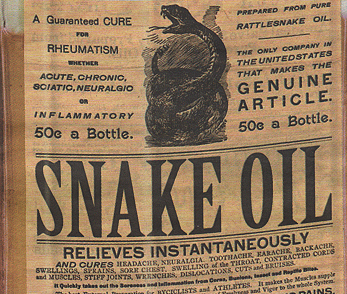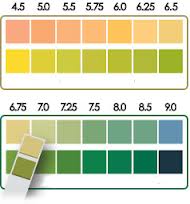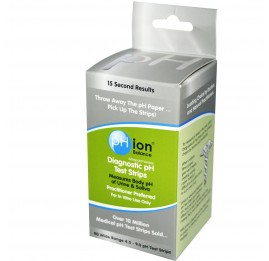Snake Oil
When talking about pH my biggest concern in discussing this topic is to be taken seriously. When a health method isn’t totally embraced by the traditional health community, it seems as though the snake oil salesmen display an inordinate number of cure-all methods and substances you can take to cure everything from gout to cancer.
You can’t be cured over night
As with most things you should stay toward the middle of the road. Don’t believe anyone who says they can cure you over night. Most of our problems took a long, long time to develop and will take almost as long to fix. There are no silver bullets, just rational science.
Why Test Your pH?
pH is an indicator that our body chemistry is either good or bad. If your pH is out of range for a long period of time, changes in our blood, organs and skin will take place to compensate for an acidic condition.
Out Of Range pH can induce unwanted body changes
These changes aren’t good and can be dealt with before real damage is done. An acidic pH level is an indicator that something is out of balance. Make corrections. Don’t ignore the “engine warning” light.
Now to Test Your pH
My Urologist is trying to bring my very acidic urine pH from a 5.0 to some where close to 7.0. He has me on 45 mg of Potassium Citrate three times a day.
Test often
Because your pH changes throughout the day it is important to test it several times during the day, maybe once a week or so.
When to test your Urine
Urine – Test your second pee of the day by placing the test strip in the urine stream for a few seconds. You test the second pee (before coffee) because the first pee from storing it overnight will be more acidic. The kidney’s job is to remove acid from the system. Wait 10-15 seconds or what ever your brand of test strips recommends and compare the color to the chart provided in the test kit. Write down this number and time and do it again 2 – 3 more times during the day.
Test Before a Meal or 2 hrs After
Remember to test either before eating a meal or 2 hours after a meal for most accurate results.
Also Test Your Saliva
Saliva – First thing in the morning, either flush your mouth with your own saliva and spit or rinse with water and wait 30 mins before testing. Wet the strip with your saliva and check against the chart as with your urine. Write the number and time down. As with the urine, test 2-3 more times during the day.
Average Results and Chart Them
You can average the numbers then chart them over time to see what difference changes in your diet can make.
The Chart
Remember that the pH chart with your kit is like an earthquake chart, it is logarithmic which means each step, ie; 4.5 to 5.5 is ten times the previous.
Which Strips?
You can find test strips in most pharmacies and health food stores or you can find them on line.
I personally use PHion Balance Diagnostic pH Test Strips.
Please let me know if you can find them less expensively, I will pass it along.
What Results Should we Expect?
What’s normal pH…
Our bodies have a number of systems which all have their own specifically preferred pH.
Expect Changes
Overall, the body’s internal chemical environment normally changes from a weak acid to a weak base within a 24-hour period.
More Acidic In The Morning
The body is usually more acid in the morning and most base at night. These physiological changes occur on a curve during this period.
Morning Should Be Slightly Less than 7.0
The slightly acid time period early morning: pH < 7.0 is perfect for the activity of the nerves, hormones and neurotransmitters. In this pH, the stored acidic wastes are dissolved into liquid form and then excreted from the body as wastes.
Blood pH
The bloodstream is the most sensitive system of the entire body, far more sensitive than any other.
Maintain A Slightly Alkaline pH
Arterial and venous blood must maintain a slightly alkaline pH: arterial blood pH = 7.41 and venous blood pH = 7.36.
Acidosis And Alkalosis
Because the normal pH of arterial blood is 7.41, a person is considered to have acidosis when the pH of blood falls below this value and to have alkalosis when the pH rises above 7.41.
Figure 3. Range of Arterial pH Values
| ACIDOSIS pH = 1 to 7.40 |
NEUTRAL pH = 7.41 |
ALKALOSIS pH = 7.42 to 14.0 |
Connective Tissue pH
A normal pH in this area is 7.34 and 7.40, a slightly more acid profile, because body cells dump as much free hydrogen (H+) as possible, buffering the blood as much as possible. However, pH in these areas can dangerously drop to concentrations of pH = 5.0.
Ideal Urine pH Values
In a pH balanced body. urine is slightly acid in the morning, (pH = 6.5 – 7.0) generally becoming more alkaline (pH = 7.5 – 8.0) by evening in healthy people primarily because no food or beverages are consumed while sleeping.
Whereas, during the day the body buffers the pH of the food and beverages consumed by releasing electrolytes and the pH level goes up. This process allows the kidneys to begin the elimination process slowly.
Urine pH Range
The pH of urine can range from an extremely unhealthy low of 4.5 to a high if 8.5, which it tolerates a little easier, depending on the acid/base status of the extracellular fluids. A high pH value may indicate the body is over buffering to compensate for a physiological system that is too acidic.
| UNHEALTHY pH < 6.0 |
NEUTRAL pH = 6.5 TO 8.0 |
UNHEALTHY pH > 8.5 |
Don’t Make The Body Overwork
When urine pH is 6.0 and below for extended periods of time, it is an indication that the body’s fluids elsewhere are too acid, and it is working overtime to rid itself of an acid medium.
When urine pH is normal, then the blood pH is normal, but when the urine pH is overly acid, the body releases too many electrolytes to keep the pH level normal and maintain life.
Easy to take urine buffer test strips are available to indirectly determine the safety of all body fluids, including blood.
Results may vary. These statements have not been evaluated by the U.S.A. Food and Drug Administration and this product is not intended to treat, cure or prevent disease.
What to Do?
More later – jughandle




